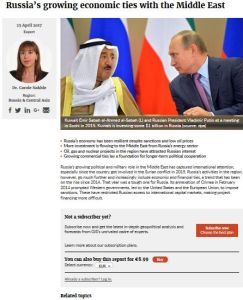Join getAbstract to access the summary!

Join getAbstract to access the summary!
Carole Nakhle
Russia’s Growing Economic Ties with the Middle East
GIS, 2017
What's inside?
Economic deals underpin the geopolitical alliances between Russia and the Middle East.
Recommendation
Russia’s role in the Syrian conflict overshadows news about its growing financial and economic links to the Middle East. Beginning in 2015, Qatar, Kuwait, Saudi Arabia and other countries in the region have been making billions of dollars of foreign direct investments in Russia. At the same time, Russia has been busy expanding energy projects in the Middle East. According to this brief but insightful article from energy economist Carole Nakhle, long-term geopolitical ties are multiplying between parts of the world that were once rivals. getAbstract recommends this eye-opening report to policy makers, energy economists and corporate executives.
Summary
About the Author
Carole Nakhle is an energy economist and the founder and CEO of Crystol Energy, a London-based consultancy.


















Comment on this summary